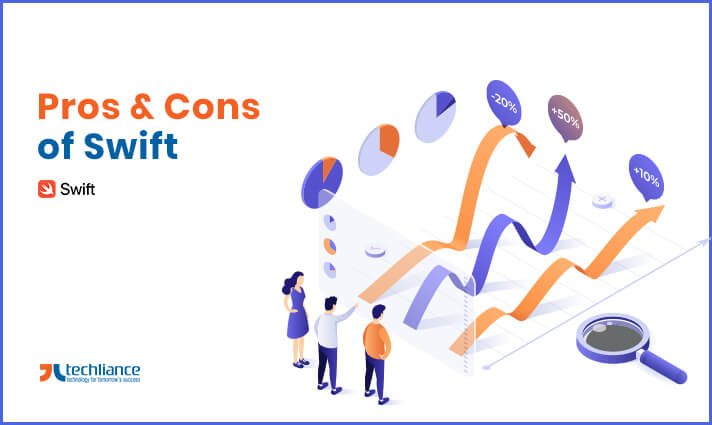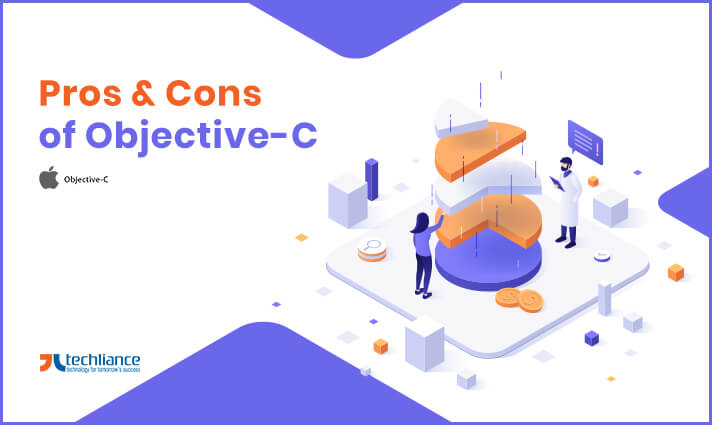When Apple’s App Store first launched in 2008, it had only 500 apps for users to download from. By 2018, the numbers had grown exponentially with 20 million iOS developers that cater to 500 million weekly visitors to the App store alone. Swift vs Objective-C is a key comparison that client companies and development resources have to make before starting the journey of a new mobile app.
In order to accommodate the growing end-consumer demands, iOS App Development Services are at an all-time high calling out for a streamlined course of action for the development of flawless iOS apps. For this reason, Objective C and Swift are the two most popular programming languages.

In terms of iPhone App Development Solutions, Swift is more of a general-purpose language used for coding for iOS, Watch OS, Linux, and TVOS. There is a very meticulous thought process behind Swift for making it easy to learn and apply in programming. At the same time, Objective-C is a widely recognized language for programming for iOS suite of products.
When we talk about Mobile App Development Services, in particular for iOS Apps, then Swift vs Objective-C is a discussion that needs to be addressed from both ends. Let’s have a thorough comparison of Swift and Objective C.
Pros of Swift
Being a newer entrant in the block since its advent in 2014, Swift has grown in popularity because of many reasons.
- It offers a great set of development tools such as Playground by Apple. Playground is a substitute for an Integrated Development Environment (IDE). Typically, an IDE has to be completely set-up for even testing out a small prototype. With Playground, you just need a developer account with Apple and you get to coding and compiling your code without the need for setting up an IDE. Easy, no?
- Like most programming languages, Swift is open-source which enables higher learning of the language even for beginners.
- It also has a Swift Package Manager which is integrated with the Swift build system for dealing with intricacies. Apple is doing its best to introduce a lot of utilities and auxiliary components to hold the interest of the developers. So, 10/10 points to Apple for making continuous efforts.
- Swift allows static typing and optional fields. You code with the specific type to use for defining a variable in the code.
- Another benefit of Swift language over Objective-C is Swift’s syntax, which is free from the use of additional characters such as semi-colons and parentheses. The code looks neater and easier to read even for beginners.

Cons of Swift
Now let’s talk about what goes against Swift.
- It is a relatively newer language so you have to let go of your previous teachings and shift to the language and its construct. At times Swift and Objective-C codes are combined in a codebase which makes it harder for a beginner level programmer to adjust and make proper coding logic. Sometimes migration effort takes strenuous energy which is not everyone’s cup of tea.
- Swift is not fully ABI stable either. Yes, Swift 5 is ABI stable for Apple platforms. But this is not the case for Linux, Windows and other platforms. In simple words, Swift’s newer versions can’t work with its older versions. It also implies that the language can’t be packed with the OS. Large apps get dumbfounded in situations where the app size increases and becomes a concern.
- It does not play well with Xcode and autocomplete just at times fails to work.
- String handling is another issue as it is clunky.
Pros of Objective-C
In our Swift vs Objective-C debate, let’s now turn our spotlight to Objective-C by elaborating its plus points.
- Objective-C is an object-oriented programming language. It is dynamic in nature as it allows swapping out method invocations at runtime using techniques like swizzling. It allows letting objects send messages to other objects at runtime. This means higher run-time adaptability and accessing private APIs.
- Objective-C has been around for over 3 decades which makes it a stable programming language. It has no surprises when it comes to bugs.
- It is completely compatible with C and C++ libraries. Objective-C is a superset of C so any programmer who has experience with C or C++ is easily able to code in Objective-C. It also gives you the chance of using third-party C and C++ libraries.

Cons of Objective-C
These are the drawbacks of the Objective-C language.
- The syntax is just very complicated. It is quite full of formatting including brackets, commas, parenthesis and what not.
- Another aspect is the block syntax which makes coding frustrating in Objective-C.
- One more lingering fear in the developer community is that Apple may cut off its patronage with Objective-C with Cocoa and other common libraries that are used to create iOS apps. If this happens, then this may probably be the end for this language. As a result, the new breed of programmers is shifting away from learning Objective-C and is opting towards Swift.
- Finally, debugging in Objective-C can be a hassle especially when you consider the dynamic nature of the language. Sending out messages to nil with the app not crashing, sway you from being in a good position to debug. The compilation is a challenge too because of Swift’s strict typing and optionals.
Swift vs Objective C – FAQs
The following are the frequently asked questions (FAQs) that come into the mind while doing a comparison like Swift vs Objective-C, whether you are a client company or a mobile developer.
In a nutshell, Objective C is based on C language which is hard to use while Swift is easier to learn. Swift allows developers to code interactively while Objective C does not.
In terms of learning Swift is easier. But Objective C has been in the industry for the last 30 years which makes it a permanent fixture for most programmers despite its clunky syntax. Swift has lesser code for writing while Objective-C requires more lines of code for getting the same action done. So in essence, Swift holds an edge over Objective C.
There is a possibility for you to code entirely in Swift, but sometimes, you may need to code in Objective C too. You may also require to migrate a legacy Obj-C mobile application to Swift. So it is a better idea to learn both Swift and Objective-C.
The official Apple website claims that Swift is 2.6 times faster than Objective-C. However, some studies indicate that the difference is not as dramatic. Swift and Objective-C are both statically typed languages that use the same iOS SDK and the high-quality Low-Level Virtual Machine compiler.
Some of the core advantages of Swift over Objective C include Readability, Maintenance, Safe Platform, Minimum Code, Less Legacy, and Speed.
Concluding Result
With the constant demand for innovative apps for iOS platforms, there is no denying the fact that Mobile App Development Services for iOS will continue to dominate the market. Both Swift and Objective-C are the most popular languages for developing iPhone App development solutions.
With easy syntax and obvious patronage by Apple, Swift will be the primary torch-bearer for the development of iOS apps in the future. If you are looking for the development of next-gen iOS apps, then contact with Techliance today for in-depth discussion or a free quotation.




